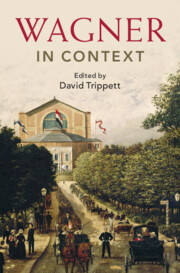Book contents
- Wagner in Context
- Composers in Context
- Wagner in Context
- Copyright page
- Contents
- Illustrations
- Musical Examples
- Contributors
- Acknowledgements
- Abbreviations
- Introduction
- I Place
- II People
- III Politics, Ideas, and Bodies
- IV Life, Language, and the Ancient World
- Chapter 23 Wagner’s Finances
- Chapter 24 Wagner’s Apprenticeship
- Chapter 25 Wagner’s Mendacious Humanism: Wagnerian Rhetoric between Nature and the Human
- Chapter 26 Declaiming Wagner: Between Genesis and Historical Performance Practice
- Chapter 27 The German Study of India and Buddhism
- Chapter 28 Greek Drama in Its Nineteenth-Century Reception
- V Music and Performance
- VI Reception
- Further Reading
- Select Bibliography
- Index
Chapter 28 - Greek Drama in Its Nineteenth-Century Reception
from IV - Life, Language, and the Ancient World
Published online by Cambridge University Press: 14 March 2024
- Wagner in Context
- Composers in Context
- Wagner in Context
- Copyright page
- Contents
- Illustrations
- Musical Examples
- Contributors
- Acknowledgements
- Abbreviations
- Introduction
- I Place
- II People
- III Politics, Ideas, and Bodies
- IV Life, Language, and the Ancient World
- Chapter 23 Wagner’s Finances
- Chapter 24 Wagner’s Apprenticeship
- Chapter 25 Wagner’s Mendacious Humanism: Wagnerian Rhetoric between Nature and the Human
- Chapter 26 Declaiming Wagner: Between Genesis and Historical Performance Practice
- Chapter 27 The German Study of India and Buddhism
- Chapter 28 Greek Drama in Its Nineteenth-Century Reception
- V Music and Performance
- VI Reception
- Further Reading
- Select Bibliography
- Index
Summary
This chapter locates Wagner’s response to Aeschylus in the Ring in the context of the three great theatrical responses to Greek tragedy which preceded his; Goethe’s Iphigenie auf Tauris, Schiller’s Die Braut von Messina, and Grillparzer’s Medea. The relationship of human beings to fate, and the power of the curse, are explored as themes which all four works have in common.
Keywords
Information
- Type
- Chapter
- Information
- Wagner in Context , pp. 275 - 284Publisher: Cambridge University PressPrint publication year: 2024
